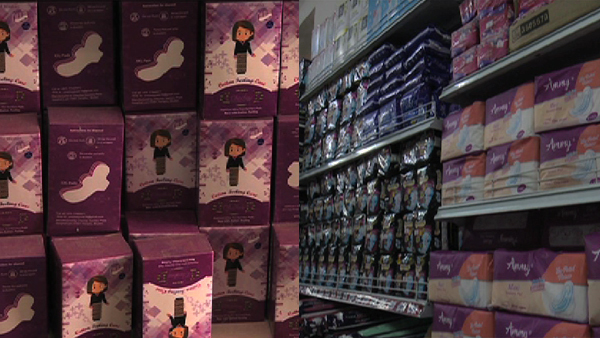 With changing times, as more Bhutanese accept and are more open about menstruation, the access to menstrual hygiene products has improved. And if figures are any indication, Bhutan has come a long way. As per the Trade Statistics, the country imported around 800,000 sanitary products last year – an increase of more than 12 times compared to a decade ago.
With changing times, as more Bhutanese accept and are more open about menstruation, the access to menstrual hygiene products has improved. And if figures are any indication, Bhutan has come a long way. As per the Trade Statistics, the country imported around 800,000 sanitary products last year – an increase of more than 12 times compared to a decade ago.
These days, walk into any grocery shop – small or big – menstrual hygiene products are on sale like any other household items. From being stacked in one corner of the shelf coupled with hesitant customers, today, the products, a variety of them, are displayed more openly.
This, many people say, testifies how Bhutanese have moved on from the social beliefs and misconceptions surrounding menstruation that continue to grip many societies across the world.
“Earlier, people were hesitant buying sanitary pads and they tried to hide the product. They were not comfortable. Nowadays, people are less bothered. Moreover, in the past, men wouldn’t come to buy such products. This has changed as well,” said Monita Rai, a salesperson in Thimphu.
“People felt uncomfortable when they came to buy pads. They couldn’t ask for it easily. But now, things have changed. They no longer ask to wrap the sanitary pads in black plastics. Even men are comfortable in asking for such products,” added Pushpa Kala, a shopkeeper in Thimphu.
A few elderly women shared that in the past, they underwent a monthly cycle of discomfort and embarrassment, besides the pain. And limited access to menstrual products, health experts say, further worsened the situation.
“In the past, during our monthly period, we would wear a kira or a skirt. So, the bleeding would drip through our legs and onto the floors. Even if we wanted to clean ourselves, the water source was located far away. We would clean the drops of blood on the floor with our feet, which made our feet crack,” said Choki Lhamo, in Chamkhar, Bumthang.
“When I lived in my village, women there wouldn’t use pads. We used rags during our period. We would wash and reuse the cloth many times. Because of that, we would get rashes and infections. At night, the blood would leak and dirty the bedsheets,” added Ran Maya in Thimphu.
The changing perceptions on menstrual hygiene also gave birth to locally manufactured sanitary pads. In 2017, Chechay Sanitary Pads, the country’s first disposable sanitary pad, was set up.
“In remote places in our country, people still hesitate to talk about menstruation. Girls and women do not have access to menstrual products and struggle a lot when on period. I had a feeling if I could start manufacturing pads in the country, it would benefit our girls and women,” said Pema Chozom, the founder of Chechay Sanitary Pads.
Recently, the education ministry and RENEW signed an agreement to promote menstrual hygiene and provide reusable sanitary pads, especially in remote schools. According to RENEW, access to sanitary pads in the remote area still remains a challenge.
“In the recent years, we have found out that, mostly in the remote areas, our girls are still having difficulties in buying sanitary napkins. Some are not able to even buy sanitary napkins, some are even resorting to socks, some are using kitchen clothes. Some do not even have underwear to wear during menstruation. This could later lead to reproductive health issues,” said Tshering Dolkar, the Executive Director of RENEW.
Amid the COVID-19 pandemic, towards uninterrupted access to menstrual hygiene products, the government also included sanitary products as an essential commodity.
For now, initiatives like these must continue because although much has been achieved, more needs to be done. We must ensure the menstrual products move from the shelves of the shops to the homes of every girl and woman across the country.
https://www.facebook.com/133972516617260/videos/512800526635606
Kinley Dem/ Pema Seldon Tshering









